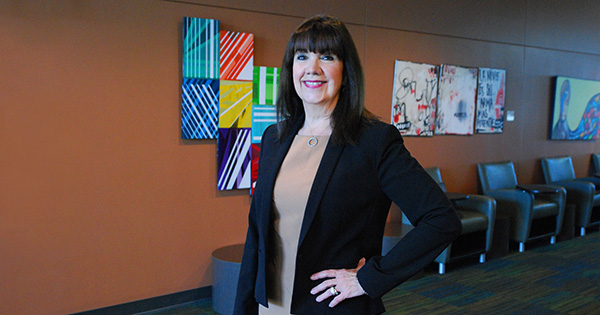By Tiffany Beyer
For the university’s new regional vice chancellor of advancement, raising private support for the university is more than a job, it’s a way of life.
“I would say no day is typical,” said Deborah Read, who became vice chancellor of advancement in February. “When you’re in the advancement world, it’s not just an eight to five job. It is truly an everyday position or commitment you’re engaged in.”
The position of regional vice chancellor of advancement has seen an increased emphasis, and the position is a high priority of Regional Chancellor Sophia Wisniewska.
The position involves bringing in private support for the university from individuals, foundations or corporations.
Public universities like USF St. Petersburg receive funds that are allocated by the state Legislature, and private funding is crucial to the university in ways that wouldn’t be possible with only state funding and tuition.
“The funding that comes from the state is a diminishing pool,” said Read. “Private support is really critical to advancing the institutions within the colleges such as scholarships for students and fellowships for graduate students and to help fund programs and buildings.”
Before joining USF St. Petersburg, she was the vice president for university advancement at the University of Dayton in Ohio, the University at Albany State University of New York and Northern Kentucky University. She was also at California Polytechnic State University.
During her career, Read has successfully run fundraising campaigns in the $350 million to $500 million range.
Read wasn’t aware that the position at the university was available until she was nominated for it.
The naming of the Kate Tiedemann College of Business, along with the $10 million donation, is a prime example of the type of university advancement Read is hoping to achieve. She hopes to have more colleges and spaces named after donors.
The gifts received by the university are typically voluntary donations. Most colleges or departments are named for the donors whose endowments are created through their philanthropic support of academic programs.
“In the best possible circumstances, you’re not really asking for the gift,” Read said. “You will engage those individuals in the life of this institution so that they understand what the priorities are.”
In the case of the Kate Tiedemann College of Business, the funding provided many initiatives to enhance the college, such as, faculty support, scholarships and funding that met the needs of the college.
“This institution has had much success (with this) over the past few years and it actually coincided with the arrival of the chancellor (Wisniewska). The chancellor is somebody who really believes in raising private support. She’s committed to it and makes her time available,” Read said.
Read works closely with Wisniewska and the deans to outline what their priorities will be in the coming years.
In a written statement, Wisniewska said “Deborah (Read) brings extensive experience to her role, having served as a major gifts officer for nearly twenty years at public and private research universities, regional universities, and a private liberal arts college. I look forward to working closely with her as we continue to develop our own culture of philanthropy.”
“Things that will always be important and have been here historically are certainly scholarships for students,” Read said. “That will always be high on the priority list.”
She considers herself a builder and is eager to explore what kind of advancement can be brought to the university. For her, it’s all about the impact.
“Hearing the students speak in appreciation for the support they received, they sometimes tear up,” she said. “I’m a sentimental person so I will too.”
Similarly, she said hearing a donor tell her the reasons why they created a fund or gave a gift can be very touching.



